This is a guest post from Pierre Far, who recently launched a very cool program called Social Alerter which notifies you as soon as your website has a solid chance of hitting the Digg or del.icio.us frontpage.
We have all engaged in debates over the past few years about social media. Is it new? If so, how? Even a recent thread on Cre8asite Forums discussed this, kicking off by someone stating they find social media very intimidating.
Then and Now
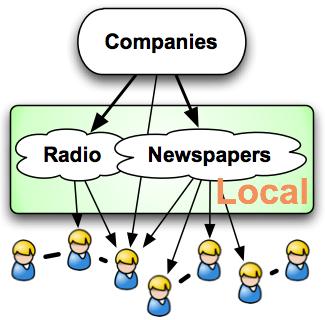
In the good old days, say from the 1850s onwards, marketing was mostly a one way “communication”: companies advertized their wares via local media like newspapers, magazines, and traveling salespeople. We certainly we had word of mouth back then, but it was geographically limited to a large degree due to travel and communication constraints. Ideas and product use spread slowly: what was a very popular product in one town was not necessarily popular in another nearby town.
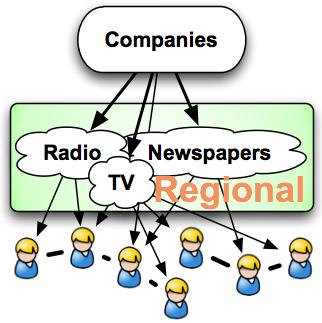
With advent of commercial radio (and TV later) and the rise of national magazines and newspapers, the media became truly about the masses. This gave rise to regional marketing with the first hints of large scale world-wide marketing. Ideas and good products spread faster. More people were reached using one advert or one advertising channel. Again, this was not new – the British Empire enabled inter-continental trade centuries earlier – but the mechanism was still similar: a product was global by being sold in a series of local markets.
Crucially though, people now had a means to cause a fuss if the product was not good giving rise to an important feedback mechanism. Simply put, the new mass media helped organize, and influence, large numbers of consumers. To take two examples: people complain about an issue to an important newspaper prompting them to push the issue into the mainstream, or if a TV station covers an event, that becomes an important topic. However, this feedback was still time-consuming and not necessarily effective: there was still a bottleneck in the form of editors and producers. The reason is that people didn’t have aggregate power: they were individual voices that a news channel or a company can choose to ignore. The only effective feedback mechanism was the free market: people choose to buy something else, if the option existed.
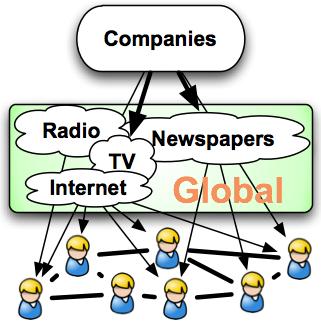
Finally, we come to the present day. People have the internet, and anyone can write up his or her thoughts – good or bad – and get thousands of people to read them. If a product is bad, there will be enough people raising their concerns loudly enough that companies have no option but to react very quickly: a few bad reviews could kill a product launch. Companies have to engage with their buyers, especially the early adopters, and make sure they’re happy.
Why is this different than a few years ago? Why do consumers now have great and collective power to, well, dictate what companies do? Yes, it’s all to do with social media. Anyone can set up a website for their personal voice; we call that a blog. Anyone can visit online meeting places like Digg and Reddit and promote the voices and opinions of others, and anyone can mobilize a group of people around a common cause on Facebook or elsewhere. Anyone can post a review on Amazon saying this product is broken and negatively affect future sales. And that’s the key differentiator of social media: we, the consumers, can have one loud voice, that companies and other people listen to. Actually, people value other people’s opinions: Amazon lets you vote on reviews. On eBay you give feedback as vote of trust for others to see and seek positive for your sellers you’re buying from.
Closing the Loop
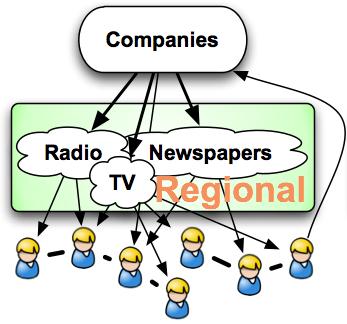
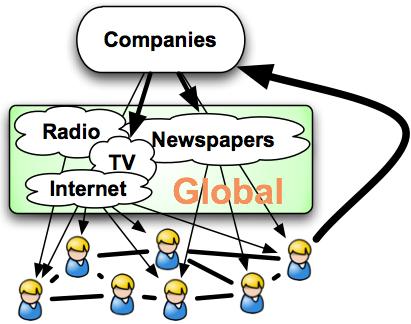
The most productive communication is always two-way: two people talking to each other, not at each other. The images you see summarize what I said above. You can see that without consumer feedback, advertising is mostly one entity (the seller) talking at another (the consumer). With the new powerful feedback mechanism implemented in social media, the loop is closed: the communication becomes two-way.
It also becomes direct. No need for the traditional media to be the conduit of communication. Now companies can talk directly to consumers and consumers talk back with the company.
A great example, one that recently affected me: A mobile phone manufacturer, called HTC, released a phone that had sub-par video performance. Geeks being geeks figured out the problem (it was the video drivers) and demanded a fix. HTC said no, and this spurred a very efficient consumer movement. Through bad reviews, forums, and a threat of a class action suit organized through a website, HTC listened and now the consumers got what they wanted – a software update is promised for the end of March. All this took a few weeks, a time scale we’ve never seen before.
Again, by no means is this new. There is no re-invention of marketing or public relations. That’s not the point. The point is that consumers now have a more potent aggregate power: someone with a problem can now reach others with the same problem faster, build a community around this shared problem easily, and mobilize lots of people behind the common cause more efficiently. That’s what’s new: a significant leap in efficiency. This gives consumers a loud voice that companies have to listen to.
So What Next?
Now we have to ask: our model tell us that the loop is now closed. All possible arrows of communication have been drawn. So what happens next? What will the new innovation, the new leap, the Web 3.0 (I hate that moniker) of marketing be?
Answer that, and you’ll be the next Seth Godin.
Pierre recently launched Social Alerter. He writes a science blog, maintains a set of SEO tools and moderates at Cre8asite Forums. He has a PhD from the University of Cambridge, UK, and works as an innovation consultant.


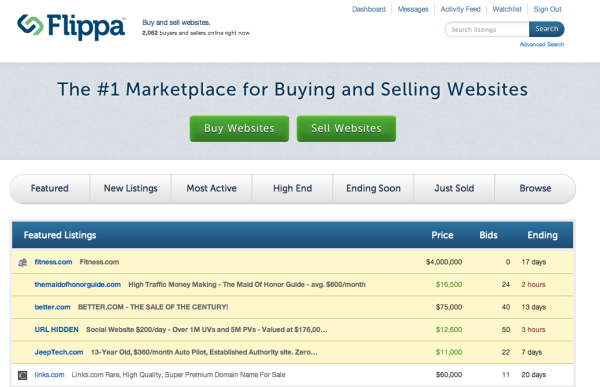


Nice guest post, Pierre. I’d like to put in my $0.02 about what happens next. Companies are at the stage that they cannot afford to sit idly by and be passive in social media.
The time has come for companies to be part of the conversation. Not just being talked about but be an active voice in the community. In a sense, they can become part of the community. This will be a much more fluid and complex model than in the more rigid boundaries of the past, but companies themselves can join in with these individual voices. If an individual can start up a blog, so can a company. As Guy Kawasaki would say, companies shouldn’t focus on being 10-15% better, but should rather jump to a new curve and strive to be 10-15 times better. They can acheive this through making their voice heard and engage with their employees, partners, competitors, and customers.
This isn’t for the faint of heart. Most companies will fire employees for having any kind of blog, but this is just the beginning. The brave companies that will put in the time to really understand the community will reap the rewards.
Great, now I have to blog about this – thanks for getting the gears turning. 🙂
Great post, Pierre. I loved your images that captured the evolution so well. I think the next step may be companies being more proactive in asking how they can improve the user experience. It’s fine for a company to say “We’re no worse than the other guy.” However if the other guy decides to get a great deal better, the competitors will never catch up. That’s the way a company really can grow in all senses of the word.
Well said!
You might be interested in a book on this topic–just published literally today(!)–The Art of Strategic Listening: Finding Market Intelligence in Blogs and Social Media (Paramount Press, Ithaca, NY)
Bob (author of the book)
http://www.paramountbooks.com/prodpage.cfm?cat_selected=82&product_selected=266
What a great explanation of web2.0. Love the graphics. It is interesting to see how mainstream social media is becoming. Once something becomes mainstream, the next new leap can’t be far behind. I’m looking forward to seeing what it will be!
I think the next evolution might be consumers becoming the new advertising entity through word-of-mouth recommendations to other consumers. I explored that today in my “From I am Media to I am Advertising” blog post.
Great synopsis Pierre! I feel that the last part about how consumers having a loud voice that needs to be attended to is very true. Because ultimately, isn’t that what is all boils down to?
Best,
Isa
760 Media
As I commented on sphinn, I definitely think social media is going to become more and more mainstream over the next year or two. Look at the difference between Obama and Clinton’s campaign for one example… Obama has leveraged social sites well and while Clinton’s campaign seems to know they need to be there, they don’t quite get it.
I think social media is here to stay and marketing through that medium is a natural progression.
(@tamar… better? 😉 )
Wow. Thank you for the responses everyone.
Brian: please drop me a line (http://socialalerter.com/contact ) when your post goes up. I’d be interested in reading it.
Barry: I think you’re onto something here. I took your argument a couple more steps and got even more stuck. However, I did find an interesting example in Dell. The situation was that Dell was being asked for a Linux computer. So they asked in public to “gauge demand”. The demand was so overwhelming that Dell released a full line-up of Linux computers. And Rob, I agree: Whatever the answer is, it will be interesting to watch it unfold.
Sebastien: Interesting idea. Certainly a sensible suggestion as to a next step, and sadly one that’s very likely. My gut reaction (and my hope!) is that people will not be happy with such an arrangement and will revolt. Facebook’s plateauing of traffic (data out today) may be explained by such a hypothesis.
Isa: it is always about the people who have money you’d like to have! If they, the consumers, suddenly have one loud voice, they will be heard. Ignore them at your peril.
Ben: I almost used Obama as an example (a big fan 🙂 ) but decided not to use a political example no matter how harmless. Of course, Ron Paul’s supporters were very active on social media sites and they didn’t get the results they wanted. It can work both ways.
Thanks again everyone. I really appreciate your comments!
Pierre
Fascinating. Is this one of the penultimate steps in the evolution of democracy. All individuals have power?
I think the pace of change in the world right now is far faster than any of us imagine. I don’t think we’ve stopped to think about it and history will tell us what happened.
I have little sympathy with business who bury their heads in the sand.
I’m not in PR, and I really suspect those who are simply aren’t taking up the challenges blogs pose as rapidly as they should. I think there will be an awful lot of corporate casualties.
And an equal number of overnight successes. Those who really do put the client on a throne and worship them – and more importantly engage in communities they currently don’t understand and in fact fear.
Small business is slow to catch on. I run an IT support company for small businesses. Not one of them has a blog (solicitors, accountants, insurance brokers etc).
It really worries me! The general public hasn’t showed up yet in the numbers they will. I forecast my daughter will be blogging before she is 10. Facebook, Myspace etc are just the start. People haven;t yet fully developed their online socialising anywhere near as much as they will.
Traditional media like TV will soon be running scared as more and more get LCDs with PCs, broadband and browsing capability included.
Watch out world. It;s going to be a roller-coaster and many of the passengers haven’t put on their safety belts.
It’s great that we are all connected now, but it’s the quality of connections and communication that matters. It doesn’t do us any good if the content being passed around is garbage.
Funny thing to mention. The title of this article caught my eye because two days ago I wrote a post called “Plotting the Relevancy Frontier“.
So what I think is that there’s a huge relevancy opportunity ahead, which is much more important than just being connected.
How about an arrow from the blogger that leads directly to Newspapers or to TV?
For example, when someone posted a video parody on YouTube, it was featured in local Philippine television. This then drove even more traffic to YouTube.
When a blogger posts an entry, and then media picks up on it, that has a greater effect on the Companies whose products are being talked about.
Certain companies will jump on this faster and do it better than others, but this is just the same as has happened with any new form of marketing. Don’t people often buy something because of a great ad, only to find they don’t really like/need the product?
I wonder if the next step for social media is integration directly into the buying cycle, maybe with ordinary people acting as resellers, or is that just too commercial to exist in a social context?
I think another thing we’ve lost are filters, and it’s having a strange effect on advertising. By filter I mean this: in your image above, there was an editor at the newspaper or a producer in Radio/TV that filtered the content. In the case of newspapers, a few people picked what was front page news. In TV, a few people picked the schedule. They were the filters (or filter). Now, the masses are the filter. We can read things from anywhere, watch anything, and do it when we want. We can make our own front page news. Listen to radio via podcasts whenever we want. We can depend on masses in places like YouTube and Digg for a mass filter, but it’s still way different than the old model.
This is a big deal because the advertising model depended, in some ways, on the filters. TV media buys are based on people picking what was on TV. These people were paid a lot of money to essentially pick what would appeal to the masses. Now that those filters are disappearing, advertisers need to find new ways to advertise (and they’ll almost never get their ad in front of the masses). That’s why they all think they want on YouTube and Facebook, but aren’t sure why.
To whatever degree history can be applied here, the tendency has been for a whole lot of new efforts which over time will narrow to the ones that work best. We are in the beginning so there will be a lot of people trying an unimaginable amount of new stuff. Then the “me too” people will jump in, that is the beginning of consolidation while the more creative and adventurous are somewhere completely different already.
Social marketing has already arrived. Facebook is growing closer to the size of google. Now the race is on for market share and the best profit model possible.
Warner Carter makes a good point. When TV came, it was three networks that ruled the roost. Then more and more came on board in a sort of me too fashion offering niche networks for people. I think we’ll see the same with Social media, but the fragmentation will happer faster. It’s already happening.
Loved this article. Social Media is certainly getting a lot of attention. I think it all boils down to relationships and getting the word out. Social Media sites give us a tool to accomplish that. Where online marketing and social media may take us is all in speculation, but as the Internet Grows I am confident so will these sources.
Megan
Great explanation! I love how social media is helping companies become more accountable, transparent and even ethical. I for one am really excited to see where it all goes.
Two rapidly upcoming technologies that will push marketing further in the social media direction are:
* cell phone barcodes – It’s common here in Japan, but Google is just starting to implement it. You will be able to take a photo of barcodes that will be located everywhere (menus, receipts, posters, signs, business cards, etc.) and your phone will visit the related Web site. All sites will have to display on mobile devices. People will share content on mobile devices through IR/SMS/email. Once the Web is better optimized for mobile devices people will add even more user generated content.
* Microformats – Web content will have more machine-readable markup and UGC (like reviews) will be aggregated into larger sites/services.
web 2 is the future!
Great information, all businesses should aim towards the new rules. I hope you don’t mind I created a link to your site on my blog, http://www.solpersona.com which aims at Hispanic Marketing.